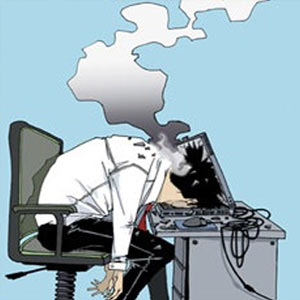 | « Back to article | Print this article |
10 myths and facts about stress
Read this and learn how stress can affect your health and everyday life.
1. Rich people are generally happier and experience less stress
Your monetary level may contribute to stress but your bank balance rarely determines whether you are happy or depressed.
Stress can be triggered by many factors -- your emotions, health issues, work issues etc.
10 myths and facts about stress
2. Working long hours is the main cause of burnout
Stress, work pressure, lifestyle, personality, many factors contribute to a burnout.
Burnout is a state of emotional, mental, and physical exhaustion caused by excessive and prolonged stress.
10 myths and facts about stress
3. People in management positions experience more stress
It may look like more responsibility would lead to more stress, research shows that having the power that comes with seniority can actually leave those in higher positions feeling less stressed.
10 myths and facts about stress
4. You are less stressed if you have a large number of friends
You will benefit from even a single supportive friend with whom you can discuss your feelings and what stresses you rather than many friends with whom you may have a conflicting or competitive relationship.
10 myths and facts about stress
5. Stress can lead to weight gain
Most people to tend to seek comfort foods (even when not hungry) when stressed in an attempt to fulfill emotional needs, and is called stress eating.
Comfort foods are usually sweet, high in fat and calories.
10 myths and facts about stress
6. You catch cold or other infections when stressed
Studies state that the body's hormonal response to stress alters immune system function that increases susceptibility to infectious diseases, heart disease, depression, and auto-immune diseases.
10 myths and facts about stress
7. Stress can cause ulcers
Physical or emotional stress may not necessarily cause an ulcer, but it can aggravate an ulcer if you have one. If suffering from acidity chronic stress aggravates it further.
10 myths and facts about stress
8. Stress directly causes premature gray hair
Stress can age you prematurely, and gray hair is part of aging.
Stress can also cause hair to fall out, and the resulting new hair can grow in gray. This could be a temporary phase.
10 myths and facts about stress
9. Chronic stress can make your hair fall out
Chronic emotional or physical stress pushes large numbers of growing hairs into a resting phase.
Within a few months, the affected hairs may fall out. Stress and hair loss don't have to be permanent.
10 myths and facts about stress
10. Stress can hamper your sex drive
Yes, stress may lower your sex drive.
Did you know that sex can be a great stress reliever, with the physical and emotional release, bonding, and release of endorphins?









